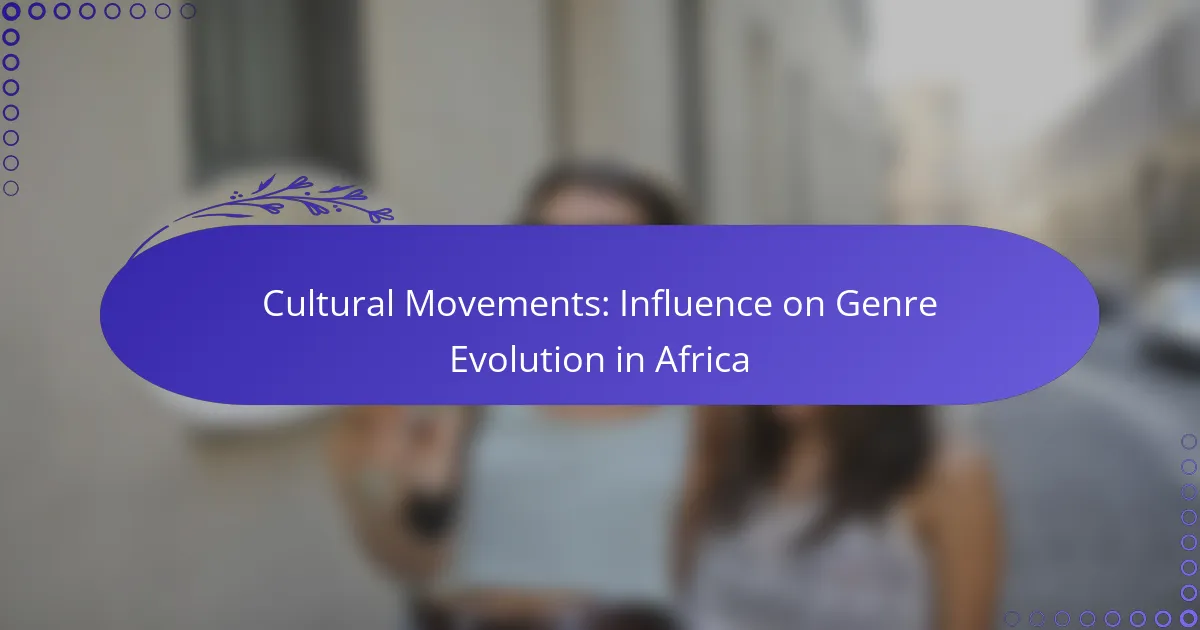Cultural movements in Africa have played a pivotal role in shaping the evolution of various music genres, merging traditional sounds with modern influences. This dynamic interplay not only gives rise to distinctive musical styles but also mirrors the continent’s rich cultural diversity and ongoing social transformations.
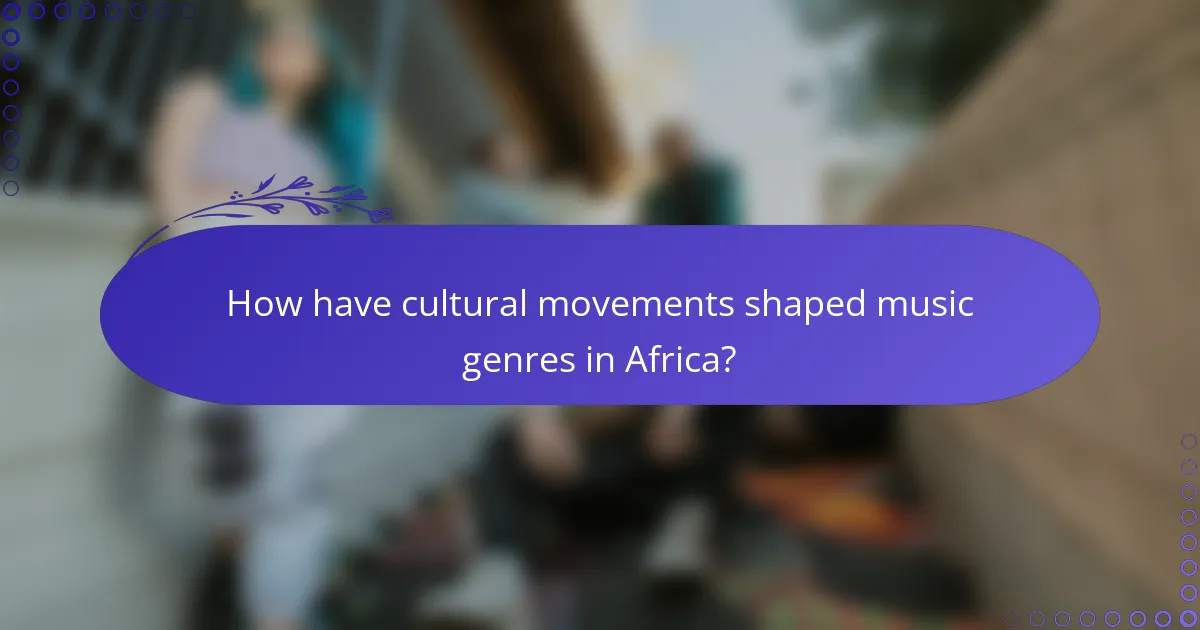
How have cultural movements shaped music genres in Africa?
Cultural movements have significantly influenced the evolution of music genres in Africa by blending traditional sounds with contemporary styles. This fusion has led to the emergence of unique genres that reflect the continent’s diverse cultural heritage and social changes.
Influence of Afrobeat
Impact of Highlife
Highlife originated in Ghana in the early 20th century, merging traditional Akan melodies with Western instruments and harmonies. This genre has evolved over the decades, influencing various styles across West Africa. Highlife’s upbeat rhythms and danceable tunes have made it a staple at celebrations, showcasing the cultural pride of its origins.
Role of Hip Hop
Hip hop in Africa has become a powerful voice for youth, addressing issues such as inequality, corruption, and identity. Emerging in the late 1980s, African hip hop artists often incorporate local languages and cultural references, creating a distinct sound that resonates with audiences. The genre has spurred a vibrant scene, with numerous festivals and competitions promoting local talent.
Effects of Traditional Folk
Traditional folk music remains a cornerstone of African culture, preserving history and storytelling through song. Genres like mbube, taarab, and griot traditions continue to influence contemporary music, providing a rich tapestry of sounds. Artists often draw from these folk roots, blending them with modern styles to create innovative music that honors their heritage while appealing to new generations.
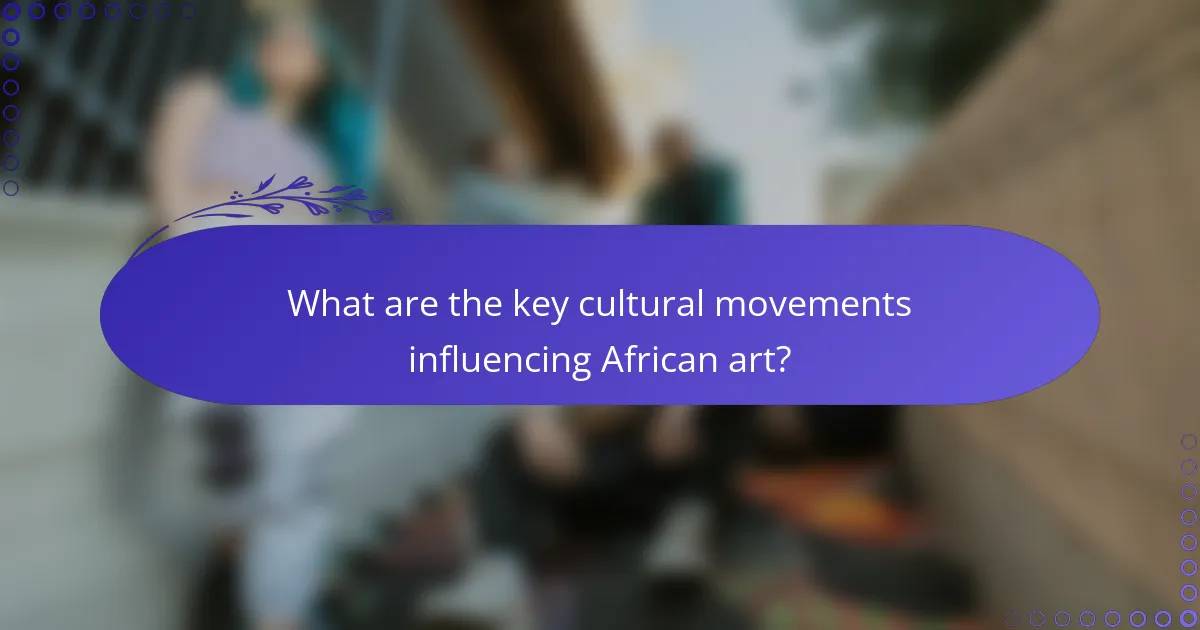
What are the key cultural movements influencing African art?
Key cultural movements influencing African art include Pan-Africanism, Post-Colonialism, and Afrofuturism. Each of these movements shapes artistic expression by reflecting historical contexts, social issues, and future aspirations.
Pan-Africanism
Pan-Africanism emphasizes unity among African nations and peoples, promoting a shared cultural identity. This movement has inspired artists to explore themes of solidarity, heritage, and resistance against colonial legacies.
Artworks influenced by Pan-Africanism often feature symbols and motifs that celebrate African history and culture. For example, the use of traditional patterns and colors can evoke a sense of belonging and pride.
Post-Colonialism
Post-Colonialism examines the effects of colonial rule on African societies and cultures. Artists in this movement critique colonial narratives and highlight the complexities of identity in a post-colonial context.
Artworks may incorporate mixed media or unconventional materials to challenge traditional forms. This approach allows artists to express their experiences and perspectives, often addressing themes such as displacement and cultural hybridity.
Afrofuturism
Afrofuturism blends African culture with science fiction, exploring futuristic themes through an African lens. This movement encourages artists to envision alternative futures that celebrate African identity and innovation.
Common elements of Afrofuturism include vibrant colors, technology, and speculative narratives. Artists often create works that imagine a future where African cultures thrive, integrating traditional elements with futuristic concepts.
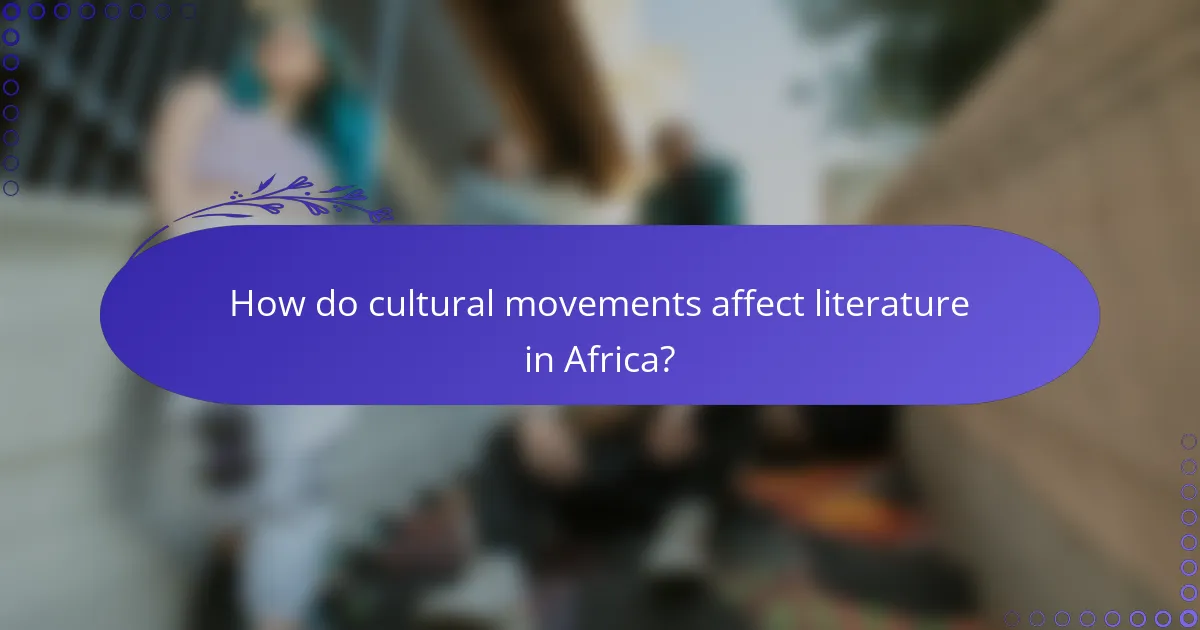
How do cultural movements affect literature in Africa?
Cultural movements significantly shape literature in Africa by influencing themes, styles, and the voices represented in literary works. These movements often reflect societal changes and aspirations, allowing writers to address local issues and global narratives.
Rise of African Literature
The rise of African literature can be traced back to the mid-20th century, coinciding with the continent’s decolonization. Writers began to express their unique identities and experiences, leading to a flourishing of diverse genres, including poetry, novels, and essays.
Notable authors such as Chinua Achebe and Ngũgĩ wa Thiong’o emerged during this period, using their works to critique colonialism and explore post-colonial themes. This literary renaissance has paved the way for contemporary African writers to gain international recognition.
Influence of Oral Traditions
Oral traditions play a crucial role in shaping African literature, as they provide a rich repository of stories, proverbs, and cultural practices. Many contemporary writers draw inspiration from these traditions, incorporating storytelling techniques and themes that resonate with their audiences.
For instance, the use of proverbs and folktales in modern narratives helps preserve cultural heritage while making literature accessible and relatable. This blending of oral and written forms enriches the literary landscape across the continent.
Impact of Feminist Movements
Feminist movements in Africa have significantly influenced literature by highlighting women’s voices and experiences. Writers are increasingly addressing gender issues, challenging patriarchal norms, and advocating for women’s rights through their works.
Authors like Chimamanda Ngozi Adichie and Buchi Emecheta have brought attention to the complexities of female identity and the struggles faced by women in various societies. This focus on gender has not only expanded the themes explored in African literature but has also fostered a greater understanding of women’s roles in cultural narratives.
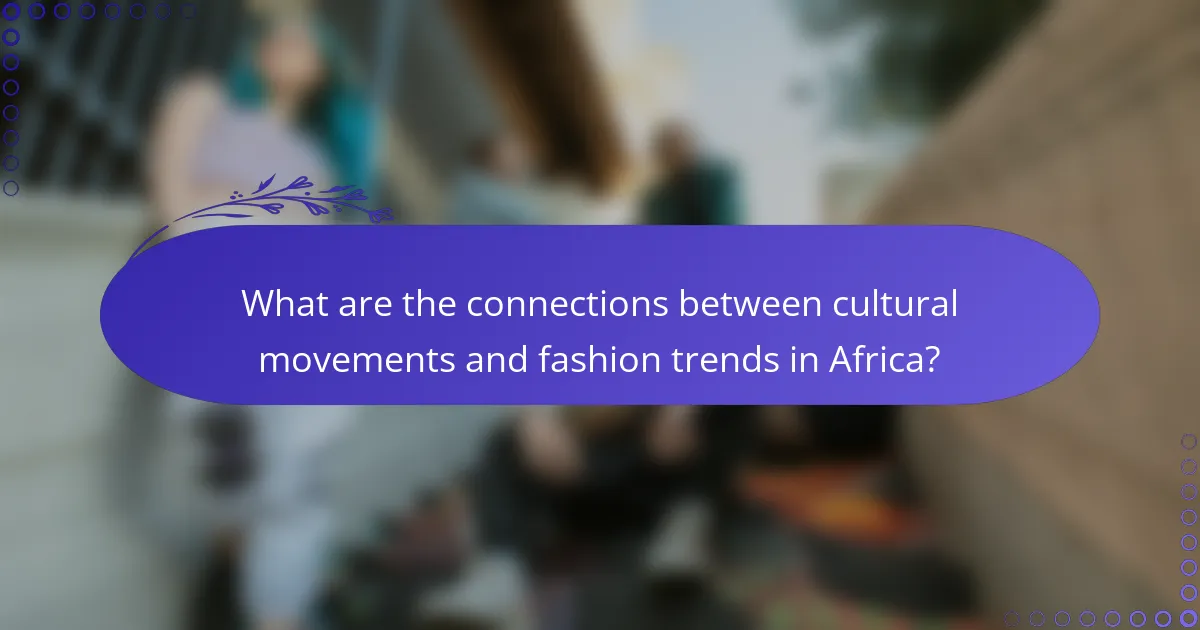
What are the connections between cultural movements and fashion trends in Africa?
Cultural movements in Africa significantly influence fashion trends by reviving traditional styles and adapting them to contemporary contexts. These connections reflect the dynamic interplay between heritage, identity, and modernity, shaping how fashion is perceived and worn across the continent.
Traditional Attire Revivals
Reviving traditional attire is a key aspect of cultural movements in Africa, where many designers draw inspiration from indigenous garments. For example, the use of vibrant fabrics and intricate beadwork in traditional clothing has seen a resurgence, particularly during cultural festivals and events. This revival not only honors heritage but also promotes local craftsmanship.
Many African countries have specific garments that symbolize cultural identity, such as the kente cloth in Ghana or the shweshwe in South Africa. These pieces are often incorporated into modern fashion, creating a blend that resonates with younger generations while preserving cultural significance.
Influence of Globalization
Globalization has introduced a fusion of styles, allowing African fashion to incorporate international trends while maintaining local authenticity. This cross-pollination results in unique designs that appeal to both local and global markets. For instance, African prints are now featured in high-fashion collections worldwide, showcasing the continent’s rich textile heritage.
However, the influence of globalization can also pose challenges, such as the risk of cultural appropriation. It is essential for designers to navigate these waters carefully, ensuring that they respect and honor the origins of the styles they adopt.
Role of Social Media
Social media plays a crucial role in shaping fashion trends in Africa by providing a platform for designers and influencers to showcase their work. Platforms like Instagram and TikTok allow for the rapid dissemination of styles, making it easier for trends to gain traction across diverse audiences. This visibility helps promote local brands and artisans, enhancing their reach.
Moreover, social media fosters a sense of community among fashion enthusiasts, encouraging discussions around cultural identity and expression. However, it is important for users to critically engage with content to avoid superficial trends that may undermine the depth of cultural significance in fashion.
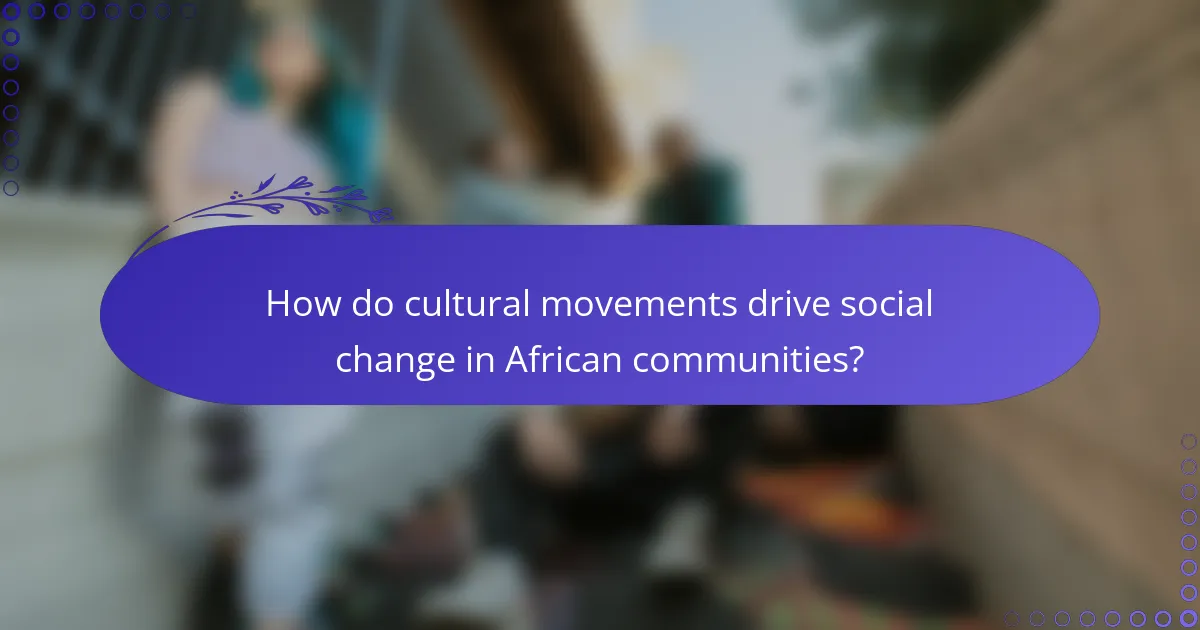
How do cultural movements drive social change in African communities?
Cultural movements in Africa play a crucial role in driving social change by fostering awareness and mobilizing communities around shared values and goals. These movements often challenge existing norms and inspire collective action, leading to significant shifts in societal attitudes and practices.
Grassroots Activism
Grassroots activism is a powerful force in African communities, often emerging from local needs and concerns. This form of activism involves ordinary citizens organizing to address issues such as poverty, education, and human rights, often without formal support from larger organizations.
Examples include community-led initiatives that focus on environmental conservation or health awareness campaigns. These movements rely on local knowledge and resources, making them particularly effective in addressing specific community challenges.
Influence on Youth Culture
Cultural movements significantly shape youth culture in Africa, providing a platform for young people to express their identities and aspirations. Through music, art, and social media, youth engage with cultural movements that resonate with their experiences and challenges.
For instance, the rise of hip-hop and Afrobeats has not only influenced music but also sparked conversations around social justice and political engagement among young Africans. This engagement encourages youth to participate actively in societal issues, fostering a sense of responsibility and community involvement.
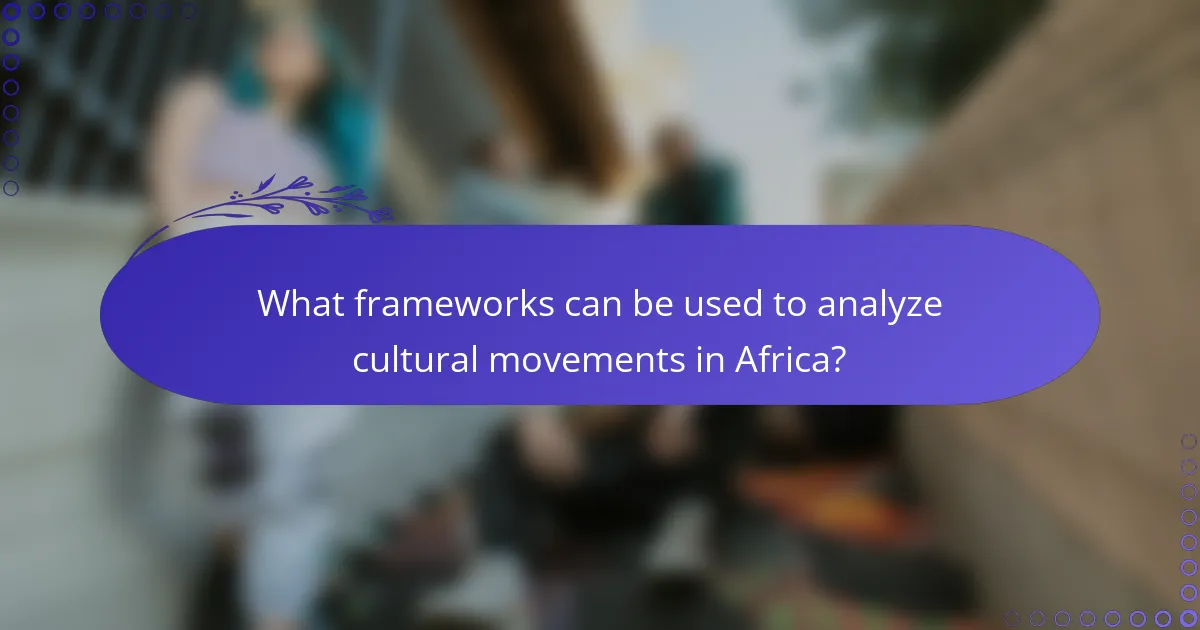
What frameworks can be used to analyze cultural movements in Africa?
Analyzing cultural movements in Africa can be approached through various frameworks that highlight social, political, and economic influences. Key frameworks include post-colonial theory, cultural studies, and social movement theory, each offering unique insights into the dynamics of cultural evolution.
Post-colonial theory
Post-colonial theory examines the impacts of colonialism on cultural identity and expression in Africa. It focuses on how colonial legacies shape contemporary cultural movements, often emphasizing resistance and reclamation of indigenous identities. This framework encourages the exploration of how African artists and thinkers reinterpret their heritage in response to historical oppression.
For example, many contemporary African writers and filmmakers draw on traditional narratives while infusing them with modern themes, creating a dialogue between past and present. This blending helps to assert cultural pride and challenge stereotypes perpetuated by colonial narratives.
Cultural studies
Cultural studies provide a lens to analyze the interplay between culture, society, and power dynamics in Africa. This framework examines how cultural movements reflect and influence social change, often focusing on popular culture, media, and grassroots activism. It highlights the role of cultural production in shaping public discourse and identity.
In practice, cultural studies might analyze the rise of Afrobeats as a musical genre, exploring its roots in traditional African rhythms and its global impact. This analysis can reveal how such movements foster a sense of community and identity among youth across the continent.
Social movement theory
Social movement theory focuses on the collective actions of groups striving for social change, making it relevant for understanding cultural movements in Africa. This framework examines the motivations, organization, and impact of movements, emphasizing the role of culture in mobilizing communities.
For instance, the #EndSARS movement in Nigeria utilized social media to raise awareness about police brutality, showcasing how cultural expressions like music and art galvanized public support. This illustrates the power of cultural movements to drive political engagement and societal transformation.
